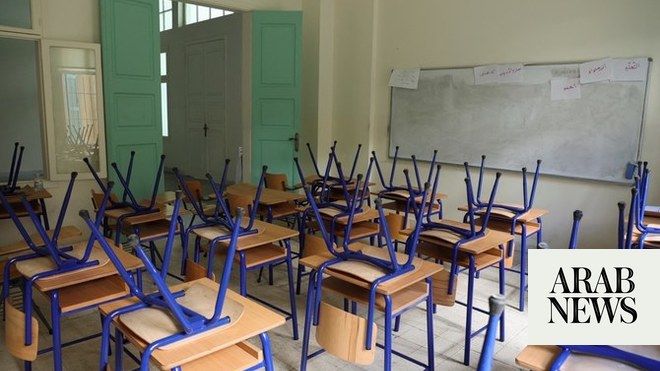
Intermediate certificate tests were set to take place next week
Examinations mark end of intermediate school, beginning of high school
BEIRUT: In a surprise move, the Lebanese Cabinet has canceled the school examinations for the intermediate (brevet) certificate, which were scheduled for July 6.
The decision has confused the Education Ministry, students and schools.
The Interior Ministry’s recent decision was based on “the logistical difficulties the security bodies are facing, which are preventing them from covering all the centers where official exams are held in Lebanon, including the official exams for the intermediate and high school certificates,” an official source said.
According to caretaker Education Minister Abbas Halabi, the only option was to “cancel the official exams for the intermediate certificate this year and carry out the ones for the high school certificate only.”
The official exams for the intermediate certificate are held in Lebanon and mark the end of intermediate school and the beginning of high school.
“Right now in Lebanon, the brevet certificate is the only way that allows us to assess the educational level of students transitioning from intermediate school to high school,” Halabi said.
He added that “there are Lebanese educational bodies and even political parties that consider the brevet certificate as a psychological burden for students and their parents.”
Public school students have had a tumultuous year, with their teachers striking over the soaring cost of fuel and unpaid salaries and resulting in them missing out on important lessons.
Amid the ongoing economic collapse, hundreds of Lebanese students have enrolled in public schools. Educators expect the trend to continue in the next academic year following the dollarization of private school tuition fees.
About 62,300 students were set to take the official exams, about 16,000 of them from private schools.
The number of Syrian students attending afternoon classes in public schools has reached 2,500. About 41,000 students attend private schools.
Halabi said the Cabinet had asked the Education Ministry to prepare “the appropriate mechanism to cancel the intermediate certificate,” but the ministry had yet to take the decision as it required the Cabinet’s approval.
He also criticized the Cabinet’s decision to cancel the certificate so close to their scheduled date, describing it as “a cynical way to deal with an important educational milestone.”
Halabi said that he had faced criticism from other ministers over his desire to continue with the certificate “when other countries have canceled it.”
“We have three solutions: we can either rely on school grades, subject students to a national exam carried out by schools instead of the ministry of education, which would set the questions for two or three subjects only, or give students certificates of completion, which is something we are trying to avoid, as all students, including those who didn’t study, will be promoted to the next grade.”
The minister warned against “manipulating the fate of the intermediate certificate” and added that “the number of supervisors and correctors is secured, the logistical arrangements are in place and the funding is available.”
The brevet certificate has been canceled three times since its resumption at the end of the Lebanese civil war.
In 2014, teachers boycotted the exams, resulting in their cancelation. In 2020, they were canceled because of the COVID-19 pandemic, and in 2021 it was deemed they could not be used to accurately assess students’ educational attainment because of the implementation of remote learning during the health crisis.
An educational expert, who asked not to be named, said the Cabinet’s move was “a populist political decision, through which politicians want to please their supporters.”
Such decisions had led the country to the place it was now, the person said.
The official exams for the high school certificate are scheduled for July 10.
Albert Chamoun, adviser to the education minister, told Arab News that “the number of students who will take these exams has reached 38,000, including a fair number of Syrian refugees.”
The number of refugees was higher this year than in the past, he added.
“Syrian students used to stop going to school after they finished ninth grade to join the labor market, but nowadays, there’s a portion of them who pursue their education all the way to the universities,” he said.
In the past, Syrian students have abstained from taking the official exams due to the differences in the Syrian and Lebanese curricula. But those who are sitting the exams this year arrived in Lebanon after the outbreak of the Syrian war and have been in the educational system since elementary class.
UNICEF covers the costs of these students’ education and pays the school fund $140 per child. It also covers the teachers’ fees and operational costs.
Due to the economic collapse, Lebanon has recently started borrowing money to fund its official exams.
While UNICEF has contributed to teachers’ fees for taking part in the tests, a loan from the World Bank will cover all of the other administrative and logistical expenses.








